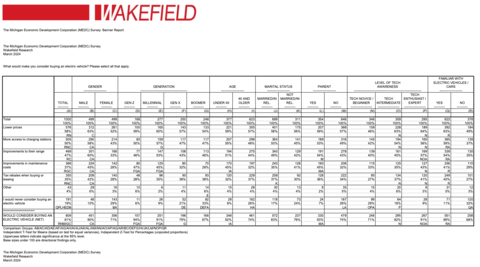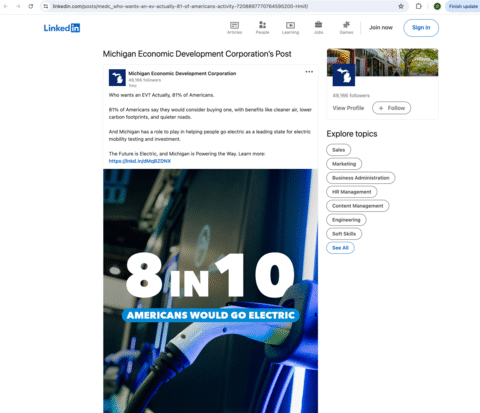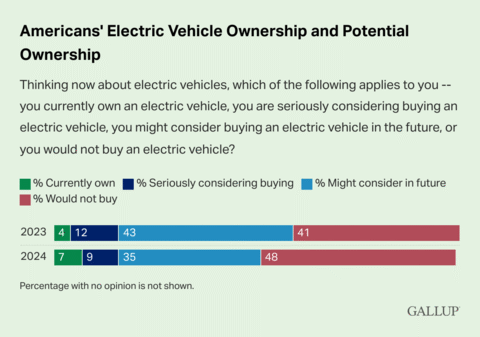Do 8 of 10 Americans want an electric vehicle?
Several surveys go against state agency claim that desire for EVs is widespread
The Michigan Economic Development Corporation claimed in a June 18 social media post that eight out of 10 Americans want an electric vehicle.
“Who wants an EV? Actually 81% of Americans,” reads a post from the state agency in charge of handing out corporate subsidies. It continues, “81% of Americans say they would consider buying one, with benefits like cleaner air, lower carbon footprints, and quieter roads.”
Survey respondents were asked: “What would make you consider buying an electric vehicle?” They could pick from a list: “Lower prices,” “More access to charging stations,” “Improvements to their range,” “Improvements in maintenance costs,” “Tax rebates when buying or leasing,” “Other,” or “I would never consider buying an electric vehicle.”
Michigan Capitol Confidential obtained the survey, conducted by Wakefield Research, from the state through an open records request.
About 19% of respondents picked the last option: “I would never consider buying an electric vehicle.”
Wakefield Research subtracted those 19% out of 100%, concluding that 81% “WOULD CONSIDER BUYING AN ELECTRIC VEHICLE (NET).”
In other words, if EVs were cheaper, if their driving range increased, if there were more charging stations, and if maintenance were cheaper, then 81% of Americans would consider buying an EV.
Danielle Emerson, the state agency’s public relations manager, told CapCon the survey included 1,000 nationally representative U.S. adults ages 18 and older, with an oversample of 250 Michigan respondents.
“One of the survey questions asked respondents ‘What would make you consider buying an electric vehicle?’ 81% of respondents listed factors that would allow them to consider buying an EV, while 19% said they would never consider buying an EV,” Emerson wrote in an email. “The MEDC is committed to working with our partners in state and local government to secure investments from businesses up and down the supply chain such that more people can consider EV ownership in the future.”
Other recent polls have found different results.
A 2023 Pew Research poll found that 38% of respondents “are very/somewhat likely to seriously consider an electric vehicle the next time they purchase a vehicle.”
A March Gallup poll found that of Americans surveyed, “9% are seriously considering buying,” 35% “might consider [a purchase] in [the] future,” and 48% “would not” buy an EV.
The MEDC and Gallup surveys were taken in March 2024, and both polled around 1,000 people. The MEDC survey asked 250 Michiganders and 750 Americans from other states. While the MEDC survey found that 19% of Americans would never consider buying an EV, Gallup found that almost half of people polled — 48% — would not buy an electric vehicle in the future. The latter number was up from 41%, recorded in 2023.
A July McKinsey report found that 46% of EV-owning respondents said they were likely to select a gas-powered vehicle for their next purchase.
Michigan Capitol Confidential is the news source produced by the Mackinac Center for Public Policy. Michigan Capitol Confidential reports with a free-market news perspective.





 State climate conference to tout clean energy plans that will raise electricity costs
State climate conference to tout clean energy plans that will raise electricity costs
 Whitmer’s latest pitch for Michigan’s auto dominance: ‘We don’t care what you drive’
Whitmer’s latest pitch for Michigan’s auto dominance: ‘We don’t care what you drive’
 Michigan State Police lease first EV at $1,062 per month
Michigan State Police lease first EV at $1,062 per month